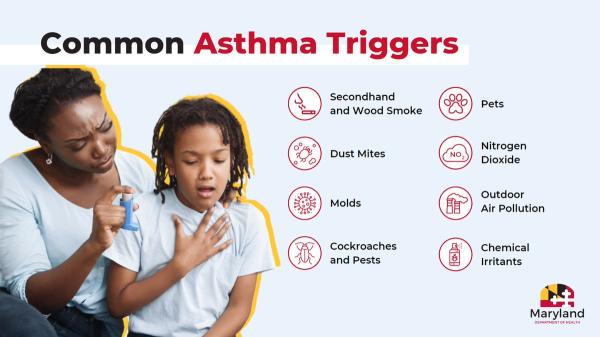| Asthma triggers in children are diverse and can include allergens like dust mites, pet dander, pollen, and mold; respiratory irritants such as smoke, air pollution, and strong fumes; viral respiratory infections like colds and the flu; and certain foods or food additives in some cases. Exercise, cold air, and emotional stress can also trigger asthma attacks in susceptible children. Identifying and managing these triggers is crucial for effective asthma control. 
Asthma triggers in children are diverse and can vary from child to child. Triggers are broadly categorized into:
1. Allergens: These are substances that cause an allergic reaction, leading to inflammation in the airways. Common allergens include: - Indoor Allergens:
- Dust mites: Microscopic creatures living in bedding, carpets, and upholstered furniture.
- Pet dander: Tiny flakes of skin shed by animals like cats, dogs, and birds.
- Cockroach allergens: Waste products and body parts of cockroaches.
- Mold: Fungi that thrive in damp environments.
- Pollen (indoor): Pollen can be brought indoors on clothing or shoes.
- Outdoor Allergens:
- Pollen: From trees, grasses, and weeds. Pollen counts vary seasonally.
- Mold spores: Found in soil, decaying organic matter, and damp areas.
2. Irritants: These substances don't cause an allergic reaction but directly irritate the airways, causing inflammation and bronchoconstriction. Examples include: - Smoke: Cigarette smoke, wood smoke, and other forms of air pollution.
- Strong smells: Perfumes, cleaning products, air fresheners, and other strong odors.
- Chemical fumes: From paints, solvents, and other industrial chemicals.
- Cold air: Can trigger bronchospasm in some children.
- Air pollution: Including ozone, nitrogen dioxide, and particulate matter.
3. Respiratory Infections: Viral infections like the common cold or influenza can trigger asthma attacks, especially in young children.
4. Exercise: In some children, strenuous physical activity can trigger asthma symptoms. This is known as exercise-induced bronchoconstriction (EIB).
5. Medications: Certain medications, such as aspirin and non-steroidal anti-inflammatory drugs (NSAIDs), can trigger asthma attacks in some individuals (though less common in children).
6. Food Additives and Preservatives: In some children, specific food additives or preservatives, such as sulfites, may trigger asthma symptoms. This is less common and often requires specific allergy testing to confirm.
7. Emotions: Stress, anxiety, and strong emotional reactions can sometimes trigger asthma attacks.
8. Gastroesophageal reflux disease (GERD): Stomach acid refluxing into the esophagus can irritate the airways and trigger asthma symptoms in some children.
It's crucial to note that identifying specific triggers for a child's asthma requires a careful evaluation by a pediatrician or allergist. Keeping a detailed asthma diary that tracks symptoms, potential exposures, and medication use can help pinpoint individual triggers.
Tags: Air Pollutants Allergy Asthma Asthma Triggers Cold Air Infections Exercise-Induced Asthma Tabacco Smoke Viral Infections  
|  1,363
1,363  0
0  0
0  3350
3350 